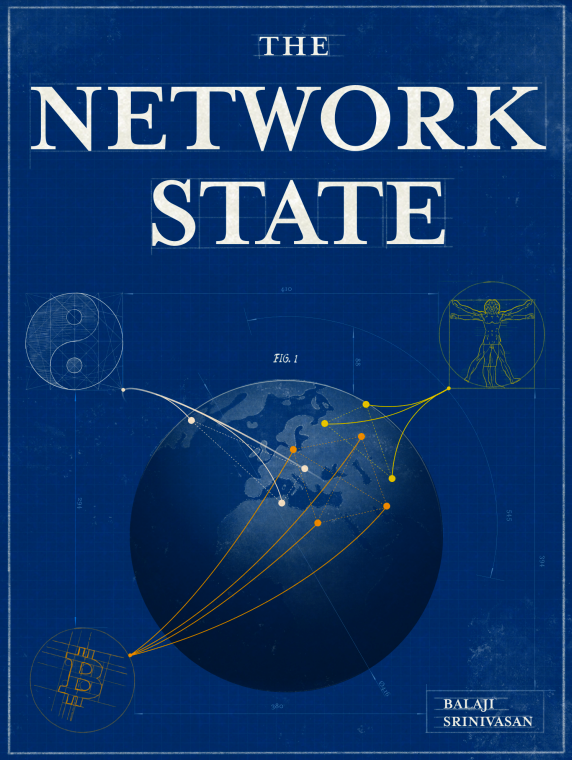The Network State: How To Start a New Country - Review by Abhishek Desikan
This eponymous book is what one would call a ‘Think Big’ initiative - how does one start a new country in the internet age, and what are the various factors at play and viability of this concept in multiple spheres - social, technical, logistical, legal, physical and financial. Balaji is a tech entrepreneur and visionary, and in his first book, he attempts to provide a vision for the future of our planet to move from nation-states to network states.
First, this book is unique in multiple ways - it is available for free to read online but is also not a typical book. Instead, it is version control in book format. Each page of the Network State can be read by referring to its URL, and it will be updated in subsequent versions with newer insights and meanings. It has a ton of references to not just other books but also anything available on the internet. In essence, it is a dynamic book and probably the first of its kind, and kudos to the author for reimagining books this way.
So what is a network state? Balaji gives the definition in one sentence, one image, one thousand words, and one essay. A network state is a social network with a moral innovation, a sense of national consciousness, a recognized founder, a capacity for collective action, an in-person level of civility, an integrated cryptocurrency, a consensual government limited by a social smart contract, an archipelago of crowdfunded physical territories, a virtual capital, and an on-chain census that proves a large enough population, income, and real-estate footprint to attain a measure of diplomatic recognition.
As we can see, there’s much to unpack in that definition, which he does in the rest of the book. He elaborates on the why’s, the hows, the whats, and the where’s associated with them. It is clear as we read the book that Balaji is a student of history, and his ability to consolidate 100s of years of human thought and action and draw parallels with today’s world makes for a fascinating read. Much of the initial part of the book is spent on understanding and re-learning history and questions one’s fundamental biases and assumptions. At every level, he also provides internet-based, cryptographically secure, and verifiable web3 alternatives to provide a vivid contrast between legacy systems and internet-first ones.
Balaji also goes into depth into political history and strategy and why a founder of a network state needs to understand history. He then makes a fascinating comparison between God, State, and Network and how each axis represents power and influence. We also go into depth on the decline of the USA and the rise of China, how the future can potentially build into a war between the two, and how the network state will be a viable alternative for other nation-states in such an eventuality.
Here he makes a comparison between NYT, CCP, and BTC. That’s the American Establishment vs. the Communist Party of China vs the Global Internet. Each of these three poles has a source of truth online: paper (NYT), party (CCP112), or protocol (BTC). Each has a digital economy surrounding that source of truth: the dollar economy, the digital yuan113, or the web3 crypto-economy. Each pole is a network in its own right, which stands outside the state; the NYT network gives direction to the American state, the CCP network leads the Chinese state, and the BTC network stands outside all states.
Towards the end, we actually come to the specifics of a network state formation. Balaji explains that it has to be in incremental steps, with each step potentially being an end state. Here he connects to various computer science fundamentals to help us visualize a digital-first country that uses AR, VR, cryptography, and other advances to create a 100% opt-in democracy instead of the existing 51% democracy.
He also clarifies that one can’t found a network state directly. Instead, you found a startup society which is a social network, then turn it into a network union which makes it a digital community capable of collective action. This network union should have a strong moral premise (such as being keto-free, for example), a sense of national consciousness, and a recognized founder who people choose to follow by joining the community. It is also critical that it has an integrated cryptocurrency that acts as the backbone of the network state. Every state asset, from smart contracts to citizen logins to birth certificates, is on-chain and protected by encryption.
From here, the network union can turn into a network archipelago by manifesting this collective action in the physical world and crowdfunding territory worldwide and connecting them via the internet. Once this on-chain census proves a large enough population, income, and real-estate footprint, we aim to get diplomatic recognition from a pre-existing government, turning the network archipelago into a network state.
While the ideas in this book may be considered wild, there’s enough data, exploration, counter-arguments, and depth to believe that this can happen in our future. Balaji spends a lot of time on tangents and repeats his ideas; overall, the book makes one imagine endless possibilities and excitement for the future of human civilization.

Also published here.